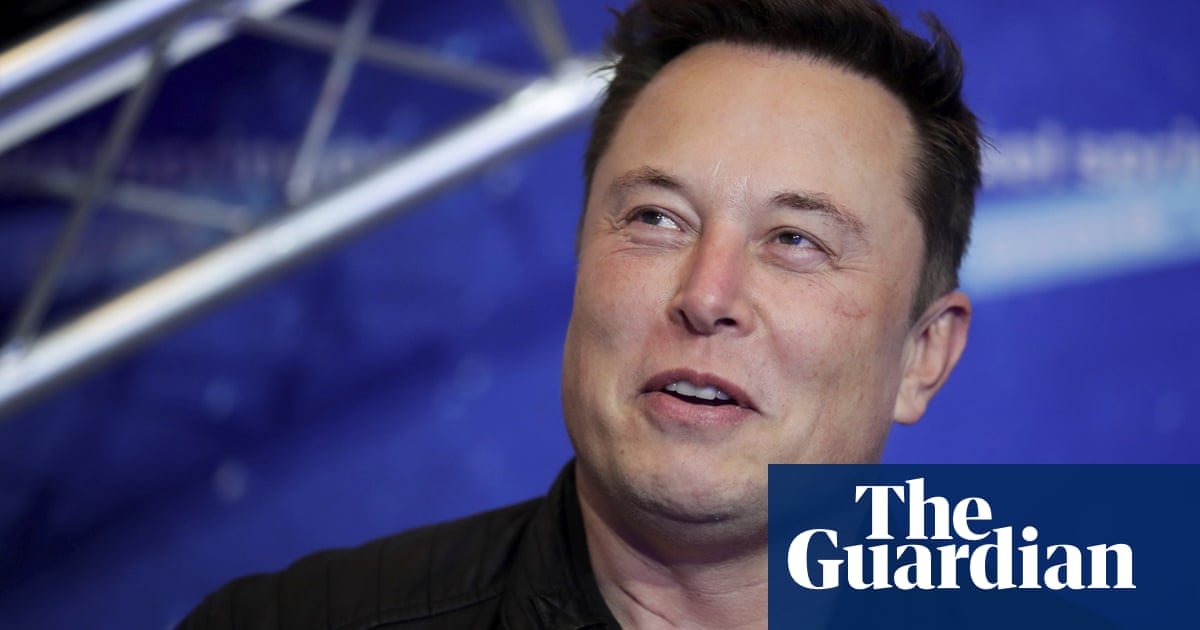Tesla criticised for opening showroom in Xinjiang despite human rights abuses
Show caption Council on American-Islamic Relations says no US company should be doing business in Xinjiang, China, after news emerged Elon Musk’s Tesla company was opening a showroom there. Photograph: Hannibal Hanschke/AP Xinjiang Tesla criticised for opening showroom in Xinjiang despite human rights abuses Elon Musk and Tesla must consider human rights in the Chinese region or risk being complicit, says Human Rights Watch Helen Davidson @heldavidson Tue 4 Jan 2022 05.38 GMT Share on Facebook
Share on Twitter
Share via Email
Tesla has opened a new showroom in the capital of Xinjiang, a region at the heart of years-long campaign by Chinese authorities of repression and assimilation against the Uyghur people.
Tesla announced the opening in Urumqi with a Weibo post on 31 December saying: “On the last day of 2021, we meet in Xinjiang. In 2022 let us together launch Xinjiang on its electric journey!”
The post was accompanied by photos of the opening festivities including people holding placards which read “Tesla [heart] Xinjiang”.
The US has enacted a range of sanctions and regulatory and other measures against China over its continuing human rights abuses in Xinjiang, including restrictions on US business dealings with local operators and suppliers.
President Joe Biden last month signed the Uyghur Forced Labor Prevention Act, and the US government intends to conduct a diplomatic boycott of the upcoming Beijing Winter Olympics.
Uyghur rights groups criticised the opening of the showroom, reportedly Tesla’s 211th in China. The Council on American-Islamic Relations urged its immediate closure, and the cessation of what it alleged “amounts to economic support for genocide”.
“No American corporation should be doing business in a region that is the focal point of a campaign of genocide targeting a religious and ethnic minority,” said the council’s director of national communications, Ibrahim Hooper.
Human Rights Watch’s Australia researcher, Sophie McNeill, said: “Beijing and businesses have long banked on a global willingness to put profits ahead of human rights, even in the face of crimes against humanity, but we must not allow this to continue in 2022.
“Elon Musk and his Tesla executives need to consider human rights in Xinjiang or risk being complicit.”
Tesla has been contacted for comment.
Tesla’s decision drew some support on Chinese social media, and followed revelations a week earlier that US tech company Intel had requested suppliers not to source goods, services, or labour from the region.
One commenter welcomed Tesla’s support for “the development and construction of Xinjiang, unlike some other companies”, an apparent reference to multinationals seeking to reduce business links with Xinjiang over the rights abuses.
Last month Intel was accused by state media of offending the Chinese market after it wrote to suppliers requesting they avoid using “any labor or source goods or services from the Xinjiang region”, citing restrictions imposed by multiple governments. After a backlash the company published a letter to “deeply apologise for the confusion”, saying the request was a matter of compliance with US law and didn’t represent its stance on Xinjiang.
Commercial operations in China have become fraught as international brands come under increasing pressure to cut ties with Xinjiang suppliers if they can’t guarantee the absence of forced labour or other abuses.
Companies including H&M and Intel have been widely criticised or threatened with boycotts in China over their decisions to distance the brand from Xinjiang labour and products. Case studies of such mass online reactions have found the nationalistic backlash is often driven or amplified by Chinese state media and state-linked social media accounts.
Xinjiang is the site of a long campaign of forced assimilation by Chinese authorities against ethnic minorities including Muslim Uyghurs. As many as one million people are estimated to have been detained in mass detention and reeducation centres, and the broader population subjected to suppression of religious and cultural activity, intense surveillance and policing, alleged forced labour programs and enforced birth control.
Governments including the US have declared the campaign to be genocide, while several human rights and legal groups have said the actions amount to crimes against humanity.
Beijing denies all accusations of human rights abuses, and says its policies are part of anti-terrorism efforts and poverty alleviation programs.













